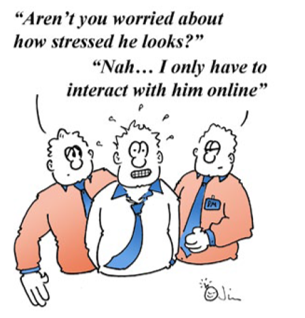Ruth Murray-Webster, Sergio Pelligrinelli and Peter Simon
 The ‘networked’ form of organisation that brings together a complex mix of in-house, out-sourced and contracted services and resources, is in vogue. Such networked organisations are seen as a way of enabling corporations to operate on the global stage, to exploit leading-edge capabilities and to ride the currents of unpredictable change without committing to expensive permanent resources. In such organisations, working virtually is the norm. So is contracting third parties to undertake specific projects.
The ‘networked’ form of organisation that brings together a complex mix of in-house, out-sourced and contracted services and resources, is in vogue. Such networked organisations are seen as a way of enabling corporations to operate on the global stage, to exploit leading-edge capabilities and to ride the currents of unpredictable change without committing to expensive permanent resources. In such organisations, working virtually is the norm. So is contracting third parties to undertake specific projects.
Virtual contractor project teams interacting with remote client contacts and dispersed stakeholder communities also feels normal. This Lucid Thought continues a theme about virtual working that we have observed in the past. This time we suggest that, while organisations have learnt much about working in virtual teams and in virtual environments over past years, they seem to continue to underestimate the challenges.
Of course this viewpoint that virtual working rarely works well could be countered by claims that today’s communications technology successfully helps sustain globally dispersed organisations and teams. Although everyone understands that this cannot fully compensate for our human preference for rich, face-to-face interaction, technology is now good enough to be good enough. For virtual working to be truly effective, we need to recognise and compensate for what we may have taken for granted in a predominantly physical environment.
Intra-organisational working is facilitated by shared norms and values, personal or collegiate relationships and occasional meetings. Externals brought in for a specific project do not have this luxury. Under pressure to deliver results, the time to build rapport is limited. Unable to ‘look the other person in the eye’, the external project team member struggles to read puzzlement or concern on stakeholders’ faces or to gauge the sincerity of a commitment.
Virtual working entails booking calls and sending emails. Project team members cannot simply exchange a few words at a coffee machine, call a stakeholder based on the other side of the world, or ‘drop in’ for a quick (informal) chat. Such practices are preferred and taken-for-granted for many. Far more planning and discipline are required, imposing inevitable rigidities. Progress stalls if something is missed, or if the project team does not press for overdue responses. Forcing the pace, however well intentioned, can create tacit resentment and covert resistance.
Workshops and brainstorming sessions feel very different when conducted via video or telephone conference, especially if some participants are physically present and others are remote. Exploration, spontaneity and creativity are curtailed and replaced by a more structured presentation and review of pre-prepared, and hopefully pre-read, materials.
Stakeholders can more easily disengage, disagree or be disingenuous without the facilitator realising. Few of us whose working practices have been honed in a physical environment feel totally comfortable in, or can fully compensate for, a virtual environment. But if we don’t become comfortable, we will quickly fall behind the expectations of the market, and the skills of those people who know no different so have mastered this way of working.
The difficulties of working in virtual teams are recognised. Project managers have to reach across time and space to forge individuals into cohesive teams. They have to build trust and confidence amongst individuals and provide support and encouragement in the absence of the rich communication facilitated by co-location. They have to sense and deal with misunderstandings, disagreement and tensions between team members in different locations and operating across diverse organisational and national cultures. They have to structure and conduct meetings in different ways, and to collate, store and distribute information in a more disciplined manner. They have to track rigorously every element of the work and follow-up methodically every instruction.
Unfortunately, the additional effort in planning and management is seldom allowed for in project budgets. If the project management is too ‘light touch’, mutual adaptation becomes an important form of coordination amongst team members. Yet, there is usually little time for the team to understand each others’ skills, views and outputs, with a consequent reliance on presumptions: individual expertise, roles, approach, ways of working, and shared values. Professional services firms and other project-based organisations expend considerable effort to create a common culture that provides a foundation for team members working together.
Nonetheless, there are still misunderstandings, things slip between the cracks and signs that individuals are struggling may not be picked up and addressed early enough. And, in an increasingly networked world, ever fewer external project ‘teams’ are from a single organisation, thus adding to the complexity of project delivery.
In the final analysis, we are faced with the reality of networked organisations and virtual working, and the ever present need to deliver projects and programmes so that desired benefits can be realised. Our view expressed in this Lucid Thought is that in such a context, maybe there need to compensate for the lack of face-to-face human interaction that enables ‘lighter-touch’ controls with increased discipline in planning and monitoring.
Close human interaction facilitates mutual adaptation and accommodation and this appears to be under-recognised and under-emphasised by some in the field of project management. However, in many organizations the days of co-location and driving/flying to get face to face are gone – maybe not for good, but certainly for now. The question therefore is how we facilitate mutual adaptation and accommodation in a virtual world.
- © Lucidus Consulting
- www.lucidusconsulting.com





